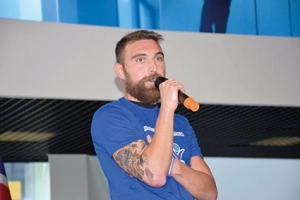Guram Kashia & Locomotive Speak Out against Bullying
On Tuesday, Georgian football (soccer, in US parlance) player Guram Kashia and players for the Tbilisi Locomotive football team visited the British-Georgian Academy in the capital to talk with students about bullying. They were also accompanied by the deputy minister of Education, Science, Culture, and Sport.
The football players were promoting the campaign “ძლიერები არ ძალადობენ” (dzlierebi ar dzaladoben - the strong do not bully). Kashia spoke with the young students earnestly, sharing painful memories from his childhood when he himself was a victim of school-yard bullies. Some of his peers had a sort of criminal mentality, he explained. At the time, sports were not cool and Kashia’s love for football was dismissed and ridiculed. The cool kids, who followed a ‘kai bichi’ lifestyle (a youth criminal subculture, popular in the 1990s and early 2000s, associated with the Georgian mafia), would stand at the cafeteria doors and force other students to pay them money to enter. Kashia admitted that he was not popular, had few friends and was afraid to stand up to the bullies. He would tell his parents he was sick so he could stay home from school and avoid them. When he was in school in the 1990s, said Kashia, there were no conversations about bullying, and both parents and children saw bullying and physical fights as normal and even healthy for young boys.
He never told his parents, or his younger brother, the truth about the bullies, worried that they would not take his fears seriously, and tell him to simply resist them. Kashia told students that he regrets that approach and wished that he would have shared the burden with his brother, that they could have stood up to the bullies together. Importantly, Kashia also spoke directly to the boys in the room, telling them that it is okay to show emotions, that it is okay to cry. He often cried when he was bullied as a child, he explained, and a boy should not feel ashamed to show his tears.
The football star’s final piece of advice to the kids was to be open – to talk with someone about their feelings, to tell an adult if they are being bullied, to seek advice from peers. He even offered to talk with the students through his personal Instagram account if they do not feel comfortable talking to other adults about bullying.
After talking with the students, Kashia and the players from Locomotive went out to the school yard to play football with the kids. Kashia said he is glad to see sports becoming increasingly popular among young people and replacing the criminal and violent mentalities that dominated when he was in school.
Today, Kashia is the vice-captain of the Georgian national football team and currently plays for the San Jose Earthquakes in California, USA. He joined the Earthquakes in June this year, alongside fellow Georgian Vako Qazaishvili. Kashia played for Dutch club Vitesse from 2010-2018, making nearly 300 appearances and scoring over 20 goals. The defender was named Georgian Player of the Year in 2012 and 2013 and was awarded the Eredivisie Player of the Month Award for August 2015.
In August, Kashia was awarded UEFA’s inaugural #EqualGame Award for his support of the LGBT community on the football field. The award is given to a player who has acted as a role model in promoting diversity, inclusion and accessibility in European football.
“Kashia won the award for taking a courageous public stand for equality. Whilst playing for Dutch top-division outfit SBV Vitesse last season, the 31-year-old central defender joined other team captains at domestic matches in the Netherlands in wearing a rainbow armband, signifying support for the LGBT community.
“Kashia’s gesture was greeted with an extremely negative and hostile response in certain quarters in his native Georgia. There were even calls for him to renounce playing for the national team. Nevertheless, he was defiant in the face of the abuse and threats he received, insisting he had no regrets about wearing the armband and underlining his full support for diversity and inclusion.” – UEFA.
After winning the award, Kashia said “I believe in equality for everyone, no matter what you believe in, who you love or who you are...I will always keep defending equality and equal rights for everyone, wherever I play."
By Samantha Guthrie
Image source: Sportall.ge












